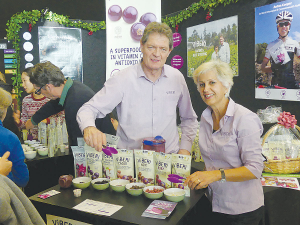International blackcurrant study may offer hope for diabetics
A new international clinical trial testing a molecule found in New Zealand blackcurrants may offer hope for thousands of Kiwis living with diabetes and associated metabolic disorders.
 Tony and Afsaneh Howey take their organic blackcurrant business, ViBERi, to the public at the recent Go Green expo in Christchurch. Photo: Rural News Group.
Tony and Afsaneh Howey take their organic blackcurrant business, ViBERi, to the public at the recent Go Green expo in Christchurch. Photo: Rural News Group.
While conventional growers would aim for a yield of about 10t/ha, Tony Howey aims for about 5t/ha.
He says the ViBERi business model is all about added value.
When they started there was only a little organic blackcurrant concentrate being imported.
“No-one else was doing organics of any consequence,” he told Hort News. “We realised there wasn’t a market sitting there waiting. We had to develop the market and the brand.”
Howey leases space at a coolstore in Washdyke where all the initial destrigging, size and colour grading and packing is done with the berries in a deep frozen state.
ViBERi’s first product was a simple pack of free flow frozen berries.
The product range now includes powders, chocolate covered freeze dried berries, soft dried berries infused with organic apple juice, and a couple of white chocolate coated lines -- one dusted with the deep purple powder.
The powder is made from freeze dried berries and can be used for smoothies, yoghurt and decoration, giving both colour and flavour. The Howeys sprinkle it on their breakfast cereal.
“It’s so good,” says Afsaneh. “Because it’s raw it’s just like eating fresh or frozen so it’s convenient.”
They plan to expand online sales while continuing to develop product ideas.
The couple also take their enthusiasm for blackcurrants on the road, presenting their products directly to the public at events such as the recent Go Green expos.
Howey says a lot of collaboration arises at such shows when exhibitors meet up and explore ways to use each other’s products in combination.
Less than half their production now goes to retail. The Howeys have powders and dried or frozen berries going as ingredients in about 25 other branded products including breakfast cereals, smoothies, juices and supplements.
Agrisea NZ has appointed Craig Hudson as it's new chief growth officer.
State farmer Landcorp, trading as Pamu, is a forecasting a full-year net profit of around $100 million.
Tony Aitken, chief executive of Ruralco, has been awarded the Excellence in Business Leadership Award at the ANZ Business of the Year Awards.
Global trade has been thrown into another bout of uncertainty following the overnight ruling by US Supreme Court, striking down President Donald Trump's decision to impose additional tariffs on trading partners.
Controls on the movement of fruit and vegetables in the Auckland suburb of Mt Roskill have been lifted.
Fonterra farmer shareholders and unit holders are in line for another payment in April.